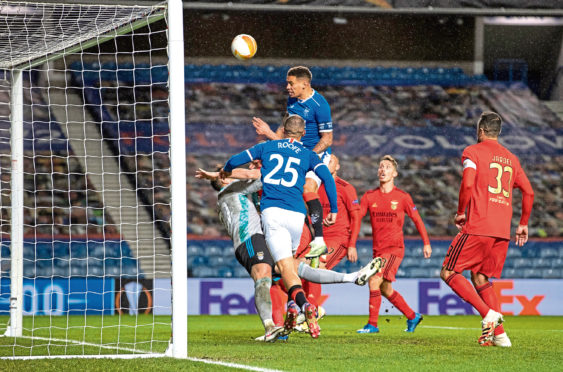
Everyone’s missing having spectators inside our football grounds.
Whether you’re a season-ticket holder, or a confirmed armchair viewer, games without fans just aren’t the same.
Take it from me, there’s even an empty feeling that hangs in the air when us neutral observers watch from the press seats.
Those who moaned about traffic jams before kick-off, and the safety implications of discarded pie crusts, should forever hold their peace.
There’s not even a debate there – we need supporters for the health and wealth of our game.
But is their absence having an impact on the pitch?
There’s a theory going around that says Rangers are prospering because they’re performing in front of empty stands.
It’s hard to imagine that anyone really believes the current fan ban is completely responsible for Steven Gerrard’s men currently enjoying an 11-point lead at the top of the Premiership.
We’re always told that fine margins decide the winners and losers at the top level.
Normally it’s the losers trotting out that line.
The Light Blues certainly look a more-ruthless, clinical outfit this season.
Much of the dither that used to slow down their play has been eradicated.
There has rarely been a hint of them losing their composure and slumping to a shock defeat.
Indeed, the closest they came was in only managing a draw at Livingston.
Ibrox captain James Tavernier is maybe the main reason why people wonder if empty seats lead to victories.
It was only nine months ago that he came under fire for admitting he and his team-mates could crumble under pressure.
In his programme notes for a game against Hamilton Accies – ironically one that ended in a 1-0 defeat and effectively ended their title hopes – he wrote: “Whenever anybody puts a bit of pressure on us in Scotland, or gets in our face, it seems to affect us too much.”
That theory brought him a torrent of criticism. Fans were calling for his sacking a skipper.
That has all since been forgotten.
Tavernier is Rangers’ top scorer this season, he’s delivering assists-a-plenty and the team are unbeaten.
The Englishman and his team-mates have continued to succeed in Europe, but they’ve added extra verve to their domestic performances.
That’s very much to their credit.
Steven Gerrard has spent more than two years talking about the need for mental strength.
He has been calling for his team to be relentless in their pursuit of honours – and it looks like his message has now hit home.
The truth, however, is that there’s really not much difference in the way the Premiership title race is panning out.
It’s easy to forget that Rangers were only two points behind Celtic, and had a game in hand, going into last season’s winter break.
Neil Lennon’s men currently have two games in hand on their greatest rivals and the pair meet again on January 2.
So there are still tests of character for the Rangers’ players, in particular those charged with providing creativity and killing off the opposition.
Time will tell if the likes of Ryan Kent, Joe Aribo, Brandon Barker, James Tavernier and Borna Barisic can keep creating the chances.
They are in line to play in front of fans for the first time in the Premiership this season when they visit Ross County next Sunday, with 300 expected to be allowed in.
Fans don’t just create pressure – they inspire and intimidate in equal measure.
The real challenge for a manager is finding players who can keep their composure when the finishing line is in sight.
Each individual has to win an internal mental battle before they’re worthy of climbing the steps to collect a trophy.
So the absence of fans – much as we lament it – doesn’t suddenly provide an extra boost to the backbone.
And here’s another, perhaps overlooked, reason why it isn’t an empty Ibrox responsible for Rangers’ success.
I’ve heard a couple of top-flight managers talk about players seeming to perform more consistently in empty grounds.
Naturally, they don’t want to name the men in question. Nobody wants to be labelled as a player who’ll go to pieces when the turnstiles start clicking again.
The point is, it’s a two-way street.
Maybe a couple of Rangers players are slightly less anxious – but they’re facing opponents coming to Ibrox not fearing the roar of a home crowd.
If I’d a pound for every time a player said they relish going to Ibrox and Parkhead, I’d be penning this column from Barbados.
As it is, we’re all just having to watch events unfold in chilly Scotland.
I’m confident the best team will come out on top next May.
And if we have full stadiums watching the conclusion to the season, that will be something for us all to celebrate.

Enjoy the convenience of having The Sunday Post delivered as a digital ePaper straight to your smartphone, tablet or computer.
Subscribe for only £5.49 a month and enjoy all the benefits of the printed paper as a digital replica.
Subscribe